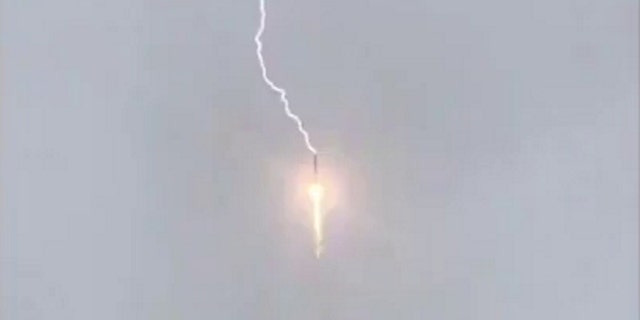Fox News Flash top headlines for May 29
Fox News Flash top headlines for May 29 are here. Check out what’s clicking on Foxnews.com
Talk about a charge.
Incredible images show a Russian Soyuz rocket being hit with a bolt of lightning 10 seconds into its flight.
The lightning bolt hit the rocket on its nose fairing, as well as its third-stage booster segment, according to the Daily Mail, which cited the spacecraft's on-board instruments.
Despite the frightening occurrence, the Russian Ministry of Defense said the spacecraft was functioning normally and was continuing its trek to low-Earth orbit, where it successfully delivered a navigation satellite.

Soyuz rocket hit by lightning. (Credit: East2West)
"A stable telemetric connection is established and maintained with the spacecraft," the government agency wrote in a post. "The on-board systems of the Glonass-M spacecraft are functioning normally."
Dmitry Rogozin, the Director General of Roscosmos, posted a video of the strike to Twitter and said not even "[l]ightning is not an obstacle for you," according to a translated version of the tweet.
Although the image of the Roscosmos Soyuz 2-1b rocket, which took off from the Plesetsk Cosmodrome on May 27, being hit may be startling to some, it's not an uncommon occurrence.
LiveScience reports that airplanes routinely get hit by lightning and the Apollo 12 mission that carried the Saturn V rocket was also hit by a lightning bolt in November 1969.
According to a 1970 NASA investigation, the Apollo 12 vehicle was hit twice by lightning during its launch, once at 36.5 seconds and the other at 52 seconds.
SECRET NASA PLANS FOR MOON BASE AND 37 ROCKET LAUNCHES REVEALED
"As a result, many temporary effects were noted in both the launch vehicle and spacecraft," the report said. "Some permanent effects were noted in the spacecraft and involved the loss of nine non-essential instrumentation sensors. All noted effects were associated with solid-state circuits, which are the most susceptible to the effects of a discharge."
The report added that lightning "can be triggered by the presence of the long electrical length created by the space vehicle and its exhaust plume in an electric field which would not otherwise have produced natural lightning."
A few instruments were knocked offline, including fuel cells, displays and telemetry, however, some innovative thinking from flight controller John Aaron and astronaut Alan Bean saved the mission, according to Science Alert.
Today, NASA has stringent weather guidelines for launches. If there is a chance of lightning within 5 miles of the launch pad, NASA will postpone a launch, the space agency said on its website.
All space agencies around the world also have lightning protection built into spacecraft, as well as their launch pads.
CLICK HERE TO GET THE FOX NEWS APP
Source: Read Full Article
